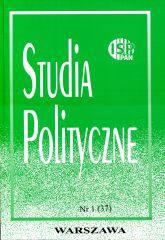W pogoni za złotem, czyli operacja "TUN"
In the Pursuit of Gold, or Operation TUN
Author(s): Andrzej PaczkowskiSubject(s): Military history, WW II and following years (1940 - 1949)
Published by: Instytut Studiów Politycznych PAN
Keywords: intelligence; the Second Section of the Polish People's Army; the National Defence Fund; Stanisław Tatar; Marian Utnik; Stanisław Nowicki; Józef Kuropieska; Wacław Komar; military conspiracy
Summary/Abstract: The tasks of the Polish Military Mission (PMW) in London, which was established in October 1945, were to represent the government in Warsaw before the British Army, to perform espionage activities, but primarily to induce the Polish Armed Forces residing in Western Europe to go back to their country and to fight the leaders of Polish emigration. During the execution of these tasks, officers of the mission (which was the agenda of the Second Section of the General Staff, or intelligence) made contact with three senior officers — Gen. Stanisław Tatar, Lt. Col. Marian Utnik, and Col. Stanislaw Nowicki — who commanded the cell responsible for liaising with the country (the Sixth Section of the General Staff of the Commander in Chief). They had at their disposal a considerable sum of money, which they did not manage to hand over to the Home Army during the war, and several hundred pounds of gold from the National Defence Fund (FON), transferred from Poland in 1939. The Committee of the Three and the Fund “Drawa” were established to manage these goods. They were all quite favourably disposed to political changes that took place in Poland and planned to return to the country where their families lived. The head of the mission, Col. Józef Kuropieska, used the money to find support for patriotic attitudes among emigrants, as well as to simply seize the funds possessed by the Committee of the Three and transfer them to Poland. After a year and a half of ongoing efforts, in June 1947 the FON’s gold was illegally transported to Warsaw and the cash (over $3 million) was gradually transferred in a similar way. Two officers, Utnik and Nowicki, entered the intelligence structures of the Second Section. In the spring of 1949, the action was completed. At the same time, however, on the wave of accelerated Stalinization of Poland, the three officers were considered foreign organizers of “military conspiracy,” whose aim was to hand over power in Poland to the advocates of “the rightist and nationalist deviation.” They were given the codename “TUN” — an acronym for their names. The officers were induced to go back to their homeland and they were arrested in November 1949. The so-called “TUN court case” was held in August 1951 and was the main lawsuit throughout the hearing of the officer corps. Among the accused were not just the members of TUN but also Kuropieska (and his successor Colonel Maksymilian Chojecki). The commanders of the Second Section were also sentenced to imprisonment. The communist military intelligence and historians who dealt with the trial regarded the imprisonment of so many officers as the greatest achievement of military special services in the Polish communist era.The article is based primarily on numerous preserved documents relating to the Second Section and the operation itself, as well as a series of investigations into “military conspiracy.”
Journal: Studia Polityczne
- Issue Year: 2015
- Issue No: 37
- Page Range: 65-91
- Page Count: 27
- Language: Polish

